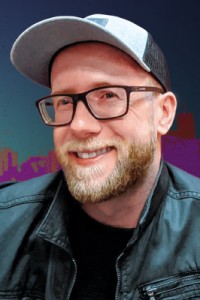John Hornor Jacobs: The Notes You Don’t Play

John Hornor Jacobs was born January 5, 1971 in Little Rock AR. He attended a small liberal arts college in Arkansas and the Art Institute of Dallas, where he studied computer animation and multimedia. He lived briefly in Boston and now lives in Arkansas with his family, where he is a longtime designer in the advertising field.
Debut Southern Gods appeared in 2011 and was a Stoker finalist. Horror novel This Dark Earth appeared in 2012. His YA Incarcerado trilogy is The Twelve-Fingered Boy (2013), The Shibboleth (2014), and The Conformity (2015). His Incorruptibles fantasy series began with The Incorruptibles (2014), continued with Foreign Devils (2015), and concluded with Infernal Machines (2017).
Novella The Sea Dreams It Is the Sky came out in 2018, and was a finalist for the Shirley Jackson Award. Collection A Lush and Seething Hell: Two Tales of Cosmic Horror appeared in 2019. His latest book is collection Murder Ballads and Other Horrific Tales (2020).
Excerpts from the interview:
“I’m all over the place, creatively. In my 20s and even my 30s I played in bands; I like doing visual arts like drawing and painting; and when I was in college I wrote a series of Faulkner-esque stories about a family that ran a dogfighting ring in Arkansas – rural noir before that was a thing. I was always a big reader, too. My capacity for novels was about five or six a week – I could read one a day. I’d wake up in the morning and open up my book and read for an hour or so – you can do that as a single person before kids. When I got home from whatever I was doing – I am a night owl – I would read until two or three in the morning. I’d shut a book, pick up a new one, and immediately start reading. Some people have issues with the idea that it takes 10,000 hours of doing something to achieve core competence, but it does help. Reading counts toward that competency as a writer. When I was young, I read tons of fantasy, and later I got into horror. In my 20s I was more into crime and Southern fiction and the American classics. I got a degree in English, so I did some reading. It was only in my 30s that I started getting back into science fiction, fantasy. Now in my 40s I’ve started writing more historical fiction, and I’m reading a lot of non-fiction now, mostly because I’m always researching something, just for verisimilitude.
“I went to college twice, once for a bachelor’s and the second time to a trade school, the Art Institute of Dallas, to get some actual skills to make money. I focused on design and broadcast graphics, but I took one class on HTML programming in 1996 or ’97, and when I came out of school in the web boom, I got a job within like one day of saying, ‘I know HTML,’ so I had to figure that out and quickly. I spent the next few years in the interactive department of an ad agency, where I cut my teeth in the ad world. I was fine with programming websites, but I enjoyed the design part more, and I’d rather someone else program it. I also enjoyed using Flash because it was animation. I spent most of my creative juices on Flash and After Effects work doing animation. I changed jobs in advertising and moved to a large internet firm here in Arkansas, where I was one of their senior creatives. It was not a creative company, though. We mostly did websites, but it was run by a bunch of people who lived in a commune. It was a weird place, and I was creatively dissatisfied. I thought, ‘Maybe I should try to write. I tried to write when I was younger; maybe this would help me.’ I was 37 years old. Like most Americans, instead of just going out and doing something, I went to Barnes & Noble and looked in the ‘How To’ section. I saw this book that said No Plot? No Problem!: A Low-Stress, High-Velocity Guide to Writing a Novel in 30 Days. It was written by the guy who founded National Novel Writing Month, Chris Baty. Coincidentally, that was October 15th, right before NaNO started in November. It was a slim little book, so I read it in an hour and a half, and thought, ‘Maybe I should try this. It’s not like I’m doing anything super creative anyway.’ I didn’t have a band at the time and wasn’t doing any visual arts other than design work. I took all the things I was reading about at the time and that interested me – mostly the history of American roots music, the A&R reps who traveled to find new talent to sign back then, and pirate radio stations that would broadcast from the Mexican side of the border, border blasters. I’d also read someone doing a riff on The King in Yellow, with the idea that seeing a performance could drive someone mad. I was fascinated by that idea, and I’ve been to Grateful Dead concerts, so I know what it’s like to listen to something that’s so terrible, for a long period of time, until you feel your sanity is going to skitter away. I took all little ideas and cobbled together a goofy sort of plot. I was reading a lot of noir, so I decided to write a noir story with a music vibe, in the ’50s, that leads into horror. I started writing it that November in 2007, did the 50,000 words – yay, I did it! – and finished the book three or four months later. I workshopped it online, and that was when I started learning about the industry. That was Southern Gods.
“I’m very privileged in the sense of having a fairly affluent job for Arkansas, so I have extra spending money that allowed me to travel and go to writing workshops and conventions and stuff – a lot of people can’t afford that. Ostensibly, you don’t need it, but I thought that was the way to do it. That’s how I met people starting out and how I learned about the industry.
“I went to one writer’s workshop and I was surprised. There were 30 people in the novel-writing track and 30 people in the short story-writing track, and almost everybody in the short story track had a story they were workshopping… but only me and two other people had a complete manuscript in the novel-writing track. All these people were just workshopping the first couple chapters, or first 50 pages. Having written my first novel, I thought I was an expert, and I was like, ‘How can you workshop something if you don’t know how it all plays out?’
“When I started writing, it was because I loved books, and wanted to see I could write one. That’s all I wanted to do. Then, once I’d written one, I thought I should see if I could make it as good as it could be – this sort of expanding ambition. Once I’d done that, I said, ‘Hm, maybe I should see if I can get it published.’ I sent it out to a small press publisher, and they accepted it… and then I was like, ‘Maybe I should see if I can get it published well.’ By that point I had met an agent at a convention through a lovely introduction. I had spoken with her and not made an ass of myself, so when I actually queried, she went, ‘Yeah, send me the first fifty.’ Me not being a dumbass when I met her probably gave me the opportunity for her not just to round-file it. Unless you’re a raving asshole, just be yourself. Be honest. Don’t harass anybody. Try not to touch anyone without permission.
“Southern Gods got the Lovecraft thing hung on it. I didn’t realize this, but the first book you write, a lot of times it’s like Jacob Marley, where the sins you commit in life hang on you as chains in the afterlife. Your first novel is the one that follows you for the rest of your career. My very first book, my whole learning process of how to write a novel, is out there for everyone to see. With every novel since, I’ve become a better writer, and I feel like I’m getting to the point where I’m discovering what my real voice is. I fumbled through nine or ten books to get there, but now I feel more confident in the ability to express what I want in a way that is individual to me. But fucking hell, man. My first book is still my most popular book! I’m won’t say each book after that has diminishing returns, but none of them are lighting the world on fire. I can’t even look at that book anymore because I can’t bear looking at the prose. People always want to talk to me about Southern Gods, and I’m a little bit done with it. Except I’m not, really, because I wrote a sequel to it in Murder Ballads.”
Photo and interview design by Francesca Myman.
Read the full interview in the August 2020 issue of Locus.
 While you are here, please take a moment to support Locus with a one-time or recurring donation. We rely on reader donations to keep the magazine and site going, and would like to keep the site paywall free, but WE NEED YOUR FINANCIAL SUPPORT to continue quality coverage of the science fiction and fantasy field.
While you are here, please take a moment to support Locus with a one-time or recurring donation. We rely on reader donations to keep the magazine and site going, and would like to keep the site paywall free, but WE NEED YOUR FINANCIAL SUPPORT to continue quality coverage of the science fiction and fantasy field.







